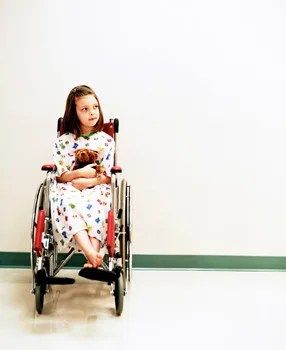Beautiful; fun-loving; intelligent; joyous. Wheel-chair bound; low-visioned; endocrine imbalanced; seizure disordered. My little girl is all of these, and more. And as difficult as it is for me to admit, some people have difficulty meeting her for the first time. I understand. Before I entered her wonderful, yet very different world, the same was true for me. For a positive exchange, consider the following:
The first several tips involve the interaction of a family with children who do not have special needs. Sometimes, by trying to correct what we perceive is problem behavior, we end up making the situation less comfortable for both kids.
Staring is one of the first issues. What’s painful to hear is, “Don’t stare,” when a well-meaning parent is trying to teach their child to be polite. What they don’t realize is that my daughter, Mikayla, stares right back — it’s normal for kids to “size” each other up. They are curious, not malicious.

However, it is helpful to teach your children, that if they are going to approach a kid with special needs, they need to be careful. Being nearly blind, Mikayla often can’t see someone just past a field of 6 feet. If they rush into the inner circle of her vision, she can be startled. She might even take a swat at them to keep them at bay; then everyone is a mess.
Some parents of special needs kids are very sensitive. They are angered or hurt when someone describes their child in terms of an outdated label. “Disabled”, for instance. I am sure there is at least one incident in every child’s life where someone called him something he found hurtful. As parents, we know that names, very often, can hurt you.
As it is for all people, labels are definers that give status, or lack of status, in society. These definers make impressions on the person to whom the label refers. Also, for people who are handicapped, it can lead to them to not thinking outside of the box of their physical limitations. Miracles can come — when people forget they have any labels at all.
Hardest of all for me to hear is, “What’s wrong with her?” If we can start thinking of this population as not being broken, we would see their status rise. It implies a defect, something that needs to be fixed. “Nothing,” as a precursor to anything you say that follows, is much easier to swallow than letting the question just hang.
Pointing out things special needs can do is a day brightener! And blessed be the moms who point out similarities between their child and Mikayla. “Wow, look, she has a Dora backpack just like you,” is a nice little uplift.
Up to a certain age, it is perfectly normal to talk about a 2-year-old to an old friend you see in the mall as if the 2-year-old weren’t there. Whether your child has special needs or not. For example, “Oh, she was such a good little girl at your party last week, wasn’t she? However, some adults forget Mikayla is in the room, even though she is now 5. Like most kids, she can hear and understand what you are saying.
There is an odd general perception that kids with special needs and their parents don’t like to receive any help. It is assumed that they don’t want any help. And more, that they shouldn’t get it because it is counter-intuitive to having them become as independent as possible. But everyone needs help now and then. I struggle with a cart and a wheelchair, for instance. I love it when people ask if they might help me to the car. Mikayla will gently tell you, “No, I got it.” Please just ask.
And please don’t forget the siblings. My son, now 12, often feels left out if no one acknowledges his presence. It’s a fact of life that special needs kids often get the lion’s share of the attention in a family with a challenged sib. Even just a simple greeting can make my older son’s day.
Remember, none of these tips is going to be used correctly without a parent who sets appropriate behavior markers for their children. And give yourself a good dose of kindness. Most parents of “normal” children find themselves feeling awkward, almost floating in an unfamiliar sea. When something small is blurted out, and you kick yourself for saying it, I know that it didn’t come from malice, but from concern. All efforts are appreciated.
Understand that just being human, we sometimes stumble; we might say the “wrong” thing, might offend or even hurt. So, we’d rather not say anything at all. And so the silence overtakes us. Or it becomes the hurried “hello”, followed as closely as a single breath to . . . a “goodbye”. As parents of these challenged kids, we hope for your lingering. For if you stay, just a little, you will glimpse the joy behind the hardship, and we will have met a new friend.
















